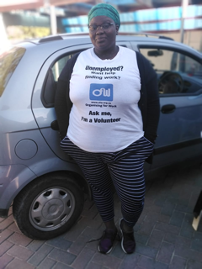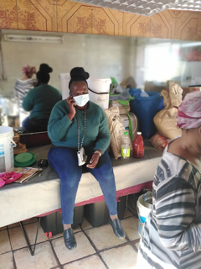Cape Town Together: Community Action Networks (CANs) driving hyperlocal change
It was March 2020 and an unprecedented nationwide lockdown was looming in South Africa. As the government frantically worked to determine its pandemic strategy, a small group of people – doctors, activists, and concerned citizens - from across Cape Town came together to determine how to enable a community-led response to COVID-19 in a city notorious for its inequality. What emerged was the rapid mobilization of over 15,000 volunteers and more than 150 Community Action Networks, or CANs, operating under the umbrella of a newly formed Cape Town Together. This networked community-led approach soon spread to other parts of the country as South Africa’s extremely strict lockdown created and revealed dire social problems. These problems – hunger, unemployment, homelessness, lack of access to health resources, sanitation, and physical space- were issues that had been present in communities before COVID-19 but were exacerbated by the suddenness of a lockdown that instantly limited access to physical, emotional, and mental resources.
Communities quickly mobilized to address these challenges on a neighborhood-by-neighborhood basis by setting up Community Action Networks through WhatsApp and Facebook groups. Each CAN had (and still has) the autonomy to focus on issues relevant to their own community coupled with the opportunity to share learnings with the broader Cape Town Together network. Examples of focus areas that emerged include food security, sanitation and hygiene, COVID-19 community care and isolation, childhood education, entrepreneurialism and employment, and urban gardening and farming, just to name a few. Unfortunately, due to Cape Town’s fragile food system, food security was a uniting theme: at the height of lockdown, it was not uncommon for one CAN to be feeding more than 5,000 people per day through networks of volunteer kitchens operating out of people’s homes, schools, and community spaces. A severe unemployment crisis and rising costs of household food items have continued to put food insecurity at the forefront of civil society needs, and most CANs have continued on, figuring out how to move forward as needs persist and donor resources dwindled.
Community Action Network (CAN) Logos: Source, Cape Town Together Facebook Page
It was through researching Cape Town Together and the CANs that I met Pamela Silwana, an unemployment activist, mother, and community organizer who is the Gugulethu CAN Admin. Since the beginning of this movement, Pam has continually championed the needs of her community and been a vocal advocate for unemployment work, social services, and the long-term changes needed in townships like Gugulethu.
I recently “sat down” with Pam - virtually given our current lockdown restraints as South Africa is in the midst of another sharp wave of COVID resurgence - and asked her to reflect on her involvement in Cape Town Together, what advice she has to give to government, and where she thinks things are heading next.
What prompted you to get involved with Cape Town Together in the beginning? What has kept you going over the past 16 months?
“I was looking for an opportunity to change the course of my life, the course of my family, and the course of my community. Cape Town Together offered lots of solutions and lots of information on how to deal with the pandemic… I was curious and wanted to [create] change…that's what drew me to Cape Town Together. And what has kept me going in the past year is many, many different things. It's the relationships built within the network, it's also the fact that the main problem that made me want to be part of Cape Town Together, the main thing that I wanted to change [unemployment], has still not be dealt with by government…we keep putting band-aids on a wound, but we haven't given the wound medication. So, that's been keeping me [going] because I want to get to a point where there are solutions for the problems that we have in the townships. Up until then, I have this drive that makes me want to keep on pushing.”
Several members of your family, including your mother, are also very active in the CAN movement. We’ve seen that women make up a large part, if not the majority of CAN admins and members. Why do you think that is?
“I think that women, we have that maternal instinct that we've been given. We are nurturers. We make things grow, we like to take care [of things]… so I think that within every woman that has joined the network, they are somehow carers and nurturers that actually want to see change, because they are connected or want to be connected to the world. Women have a heart - I'm not saying that men don't - but women tend to have a heart and are doers… we respond with our hearts and want to make change. I think that's why we are not crazy about power, we want to share it, because we're also sharers.”
Cape Town Together initially formed as a movement to enable a community-led response to COVID-19. The pandemic has continued to evolve in South Africa and CANs have continued to evolve their work as community needs have shifted. What advice would you give to government as the pandemic continues on?
“I wish that government could [understand] that we actually don't want to do their job, but we do it because they're not doing it. And when we want to collaborate with them, they should bring something to the table. The CANs are working [for] no salary. They do the work because it's needed to be done, and government is not doing that work but actually has the resources to do it. The government [has so much] red tape…why offer something that you know that someone is really not going to get. It's like you saying, ‘I can help, but you just have to jump [through] all these hoops before I help’. And then you end up not actually jumping through all the hoops, and you fail. So my advice would be to government; work with the CANs…be part of the movement. And don't try to come [in] and stifle, but allow the way that they are working… join in something that is actually going to benefit the country. We are doers in the CAN, we don't wait for red [tape], or for so many things that are [trying to] stop us, we just do, which is something that government is lacking… they're always meeting, processing things. So I would say…just do and when you say collaborate, share resources and share ideas.”
Looking back at the past 16 months and everything that you’ve learned and experienced with Cape Town Together and the Gugulethu CAN, what are you most proud of?
“I'm proud of what Cape Town Together has accomplished, bringing different people [together], people that didn't know each other, creating relationships with them, and working together to help our community… we don't look at the color of your skin, or race… we are just helping. And being able to influence many people to join in and inspire them to be changemakers in their own communities closer to them, I'm very proud of that.
Personally, I'm proud of being a mom to my four kids and being able to do this work, that pushes me to keep on trying to find a better solution for my community and for my country so that my kids when they grow up, they grow up in a better world and hopefully…when they are older adults [they] also live with this vision to be changemakers. I'm also very proud of my CAN. Having started from March [2020], and now it's July [2021] and they've been feeding [people the whole time]. I'm always at my upmost with gratitude and I just feel very proud of the people that I met through the network and they keep on serving our country, being the best that they can so that's what I'm proud of.
And mostly I'm also proud of my mother… her resilience, her strength. It pushes me to better myself and want better things for me, for my family and for my country.”
Pamela and her mother, Maria, who has actively run a community kitchen since the beginning of the lockdown in 2020. Source: Isa-Lee Jacobson
Looking forward, what’s next for the Gugulethu CAN, Cape Town Together, and yourself?
“We [the Gugulethu CAN] are still feeding, and we want to try to make sure that the [community] kitchens find ways to be sustainable and keep doing our programs. We want to open up a hub. The future is a Gugulethu hub where we have access to a facility where children, teens, and unemployed people can come in and access free data [for their phones], get help [from] social workers, you know, just a place where organizations such as the CANs and many others can come in and take up the space and come up with ideas that are going to benefit Gugulethu. That's what we want for the future.
For Cape Town Together, I'm currently a consultant for the Bertha Centre where we [are trying to] help the network and struggling CANs come up with ideas, like we want to have system labs where we're seeing through many things, [including the] problems that we're having as a network and see what's next.
For myself, I want to write. I don't have time to write [right now], but I want to come to a place where I write and share stories of Gugulethu. [I also want to] grow Organising for Work (OfW) to be a well-established NPO that helps the unemployed and to link up with organizations that can actually collaborate with OfW to focus on the unemployment of my community. I feel that is the major thing, we see people in the [community kitchen] lines because they need to be working and I would love to be working on that and writing about that.
Gugulethu and Seaboard CAN members at a market day on the Sea Point promenade with partners Gugulethu Urban Farming Initiative, Mini Meltdown, Souper Troopers, and Ladles of Love. Source: Seaboard CAN
To learn more about Cape Town Together and the extraordinary work of thousands of ordinary citizens, visit https://capetowntogether.net/
To support Pam’s work and the ongoing Gugulethu/Seaboard CAN partnership, visit https://seaboardcan.org/Donate.
Pamela Silwana is a Director of the nonprofit Organizing for Work, as well as the admin and founder of the Gugulethu CAN. She is also a fellow of a programme at University of Western Cape that is studying the response to COVID-19 and a consultant for the Bertha Centre. She has been a peer facilitator at the National Youth Development Agency and Khulisa Social Solutions, has done fieldwork and admin for UCT and University of Stellenbosch. She also does occasional tutoring and childcare work.
Jenny Soderbergh is a master’s student at the University of Cape Town Graduate School of Business in the Inclusive Innovation program. Her research is focused on how initiatives and organizations born out of crisis relief – specifically the COVID-19 crisis in Cape Town - can transition towards systemic social innovation. She works with Kati Collective as a creative freelancer and enjoys infusing creativity in to the worlds of practitioners and academia.





